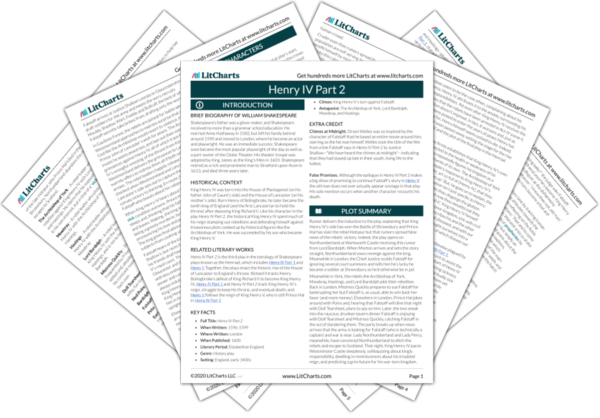In exploring disease and the right to the throne, Henry IV Part 2 also explores the theme of time through the aging body and the aging memory’s interpretations of history. Aside from being sick, King Henry IV is simply old. He complains frequently about his weary agedness and about the way the years have worn on him, rendering his boisterous, ambitious youth unrecognizable to his current self. Falstaff likewise struggles with his aging human body. Already middle-aged and aging even faster due to gluttony and a drinking habit, Falstaff is continually called out for being old. If Henry IV Part 1 featured Falstaff as a carefree, young spirit who could frolic in spite of his white hair, Henry IV Part 2 presents him as a tired man, falling into decay and scrambling pathetically to keep up with his own reckless lifestyle. The Chief Justice ridicules Falstaff for trying to act younger than he is and insists that the old man’s body betrays him. “Do you set down your name in the scroll of youth, that are written down old with all the characters of age? Have you not a moist eye? a dry hand? a yellow cheek? a white beard? a decreasing leg? an increasing belly?” the judge asks Falstaff. Spurning his once-beloved friend once he’s become King Henry V, Prince Hal, too, expresses disgust at the disharmony between Falstaff’s age and behavior: “I know thee not, old man,” the prince sneers, “How ill white hairs become a fool and jester!”
Meanwhile, other characters explore time by tracking human memory and noting people’s shifting attitudes towards the past. As the Archbishop of York notes reflecting on the fickle likes and dislikes of the English populations: “Past and to come seems best; things present worst.” Later, Warwick tries to shake King Henry IV of his grim fixation on magical prophecies by insisting that prophecy is no oracular power but simply an insightful reading of history and an educated guess about the future. “There is a history in all men’s lives,” he explains, “figuring the natures of the times deceased; The which observed, a man may prophesy, with a near aim, of the main chance of things as yet not come to life, who in their seeds and weak beginning lie intreasured. Such things become the hatch and brood of time.”
Time ThemeTracker

Time Quotes in Henry IV Part 2
Do you set down your name in the scroll of youth, that are written down old with all the characters of age? Have you not a moist eye? a dry hand? a yellow cheek? a white beard? a decreasing leg? an increasing belly? is not your voice broken? your wind short? your chin double? your wit single? and every part about you blasted with antiquity? and will you yet call yourself young? Fie, fie, fie, Sir John! (155-160)
A man can no more separate age and covetousness than a' can part young limbs and lechery: but the gout galls the one, and the pox pinches the other; and so both the degrees prevent my curses. (198-200)
Is it not strange that desire should so many years outlive performance? (234)
Rumour doth double, like the voice and echo,
The numbers of the fear’d...
…Upon my soul, my lord,
The powers that you already have sent forth
Shall bring this prize in very easily. (99-103)
Lord, Lord, how subject we old men are to this vice of lying! (263)
Construe the times to their necessities,
And you shall say indeed, it is the time,
And not the king, that doth you injuries. (105-107)
I know thee not, old man: fall to thy prayers;
How ill white hairs become a fool and jester!
I have long dream'd of such a kind of man,
So surfeit-swell'd, so old and so profane;
But, being awaked, I do despise my dream.
Make less thy body hence, and more thy grace;
Leave gormandizing; know the grave doth gape
For thee thrice wider than for other men.
Reply not to me with a fool-born jest. (43-52)
















